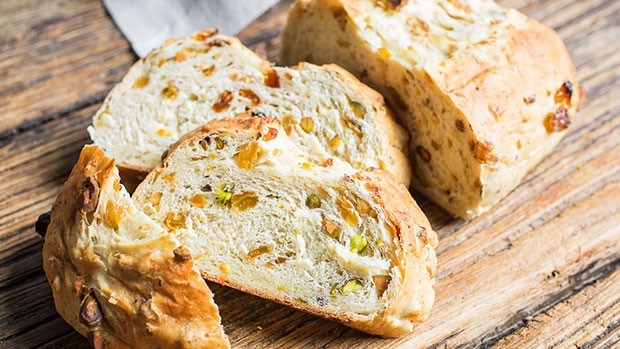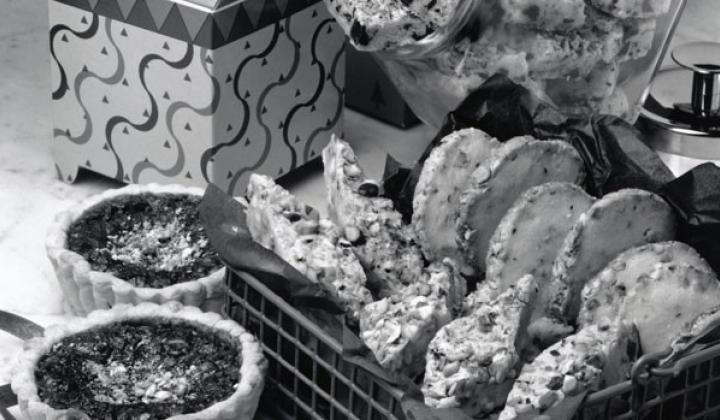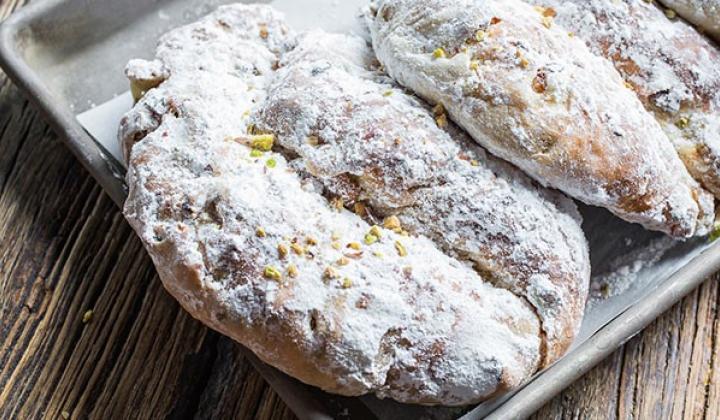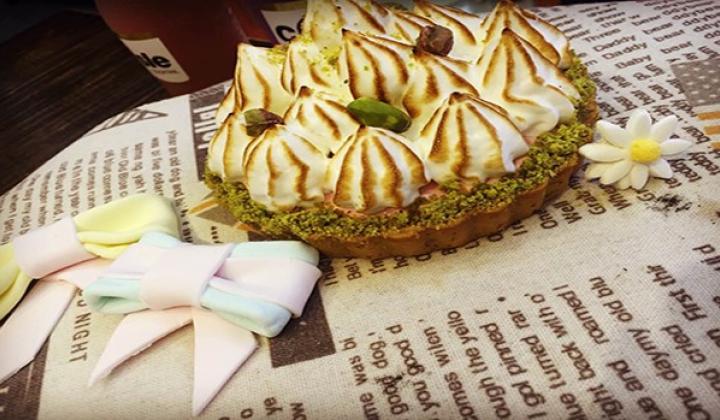Pistachio Quark Bread

Yield
Ingredients
|
Dough |
g/ml |
lbs./oz |
Baker's % |
Yield % |
Notes |
|
Flour, bread |
10000 g |
22 lbs 1 oz |
100.00 % |
37.33 % |
|
|
Shortening |
500 g |
1 lb 2 oz |
5.00 % |
1.87 % |
|
|
Margarine |
500 g |
1 lb 2 oz |
5.00 % |
1.87 % |
|
|
Salt |
200 g |
7 oz |
2.00 % |
0.75 % |
|
|
Yeast, compressed |
600 g |
1 lb 5 oz |
6.00 % |
2.24 % |
|
|
Dough conditioner |
100 g |
4 oz |
1.00 % |
0.37 % |
optional |
|
Sugar, granulated |
1500 g |
3 lbs 5 oz |
15.00 % |
5.60 % |
|
|
Quark |
3000 g |
6 lbs 10 oz |
30.00 % |
11.20 % |
|
|
Cardamom, ground |
50 g |
2 oz |
0.50 % |
0.19 % |
|
|
Raisins, golden |
3000 g |
6 lbs 10 oz |
30.00 % |
11.20 % |
|
|
Orange, peel |
1000 g |
2 lbs 3 oz |
10.00 % |
3.73 % |
|
|
Water |
3900 ml |
8 lbs 10 oz |
39.00 % |
14.56 % |
|
|
American Pistachios |
2435 g |
5 lbs 6 oz |
24.35 % |
9.09 % |
roasted, roughly chopped |
|
Total |
26785 g |
59 lbs 3 oz |
267.85 % |
100.00% |
Instructions
Combine all ingredients, except the fruits and American Pistachios in a mixing bowl.
With dough hook mix on first gear for three minutes (pick-up stage). Stop the mixer and put gearshift into neutral. Scrape down the side of the bowl and check the dough consistency. Be prepared to add additional water to yield dough of proper consistency. Restart in third gear for seven more minutes. Add the fruits and American Pistachios, blend until incorporated. Do not over mix; this will destroy the fruits.
Lightly dust the surface of a workbench and place the dough onto the surface. After mixing the dough temperature will ideally be 24°C (76°F). Cover to prevent the dough from drying out. Bench rest for 20 minutes.
Punch the dough down and fold the dough over to release the gases and supply the yeast with new food. Bench rest additional 10 minutes.
Divide into 485 g (17 oz) pieces, round, and cover. After 10 minutes bench rest, shape the dough pieces into ovals and place them on a parchment paper lined sheet pan.
Proof for approximately 20-30 minutes, or until doubled in size. Score ones lengthwise. Bake at 190°C (392°F) with little steam (damper closed) for 25-30 minutes. Baking time and temperatures will vary depending on your equipment. Any changes in the temperature must be accompanied by proper adjustments in the baking time; thus an increase in temperature requires a decrease in baking time.
Once removed, brush the bread with melted clarified butter and roll in granulated (vanilla) sugar.
Notes
Raisins must be properly conditioned to increase their moisture content before addition to the dough, thus minimizing the moisture absorption from the bread dough. To avoid sugar loss from raisins the recommended method for conditioning raisins is to cover the raisins with 26.5°C (80°F) water and then drain immediately. There is no soaking time. The raisins are then left to stand for at least four hours before blending them into the dough. The last step allows the raisins to absorb any remaining moisture in the outer skin with no significant leaching of sugar solids.
If quark is not available, exchange with equal amounts of farmers cheese, bakers cheese, cream cheese or yogurt and fromage frais.
Check the dough consistency, be prepared to change the amount of water added to yield dough of proper consistency. Golden raisins can be exchanged with equal parts of black raisins. Quark is traditional, creamery, vegetarian, fresh soft cheese made from cow's milk originated in Germany. It is moist, white cheese. It has a light taste and a smooth and soft texture. Quark simply means, "curd" in German. Quark can be made from whole, skimmed or semi-skimmed milk or even buttermilk. Soft and moist, like a cross between yogurt and fromage frais, it should taste lemon-fresh. This cheese ripens within a few days.











